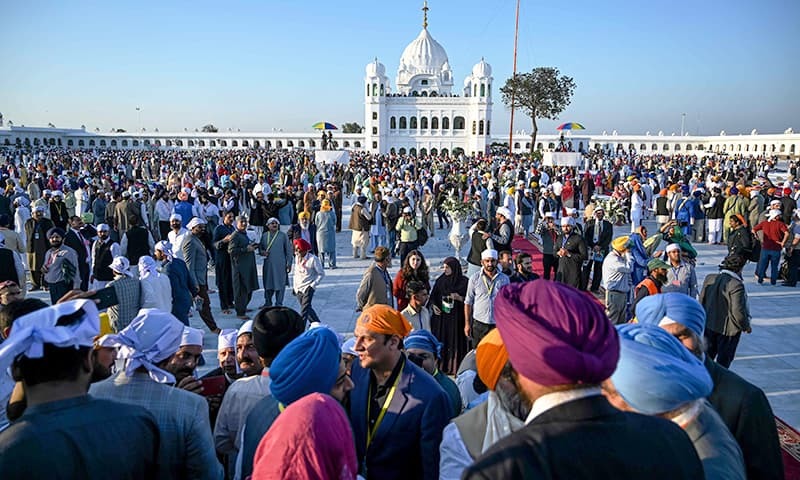ISLAMABAD: As Pakistan celebrated the first anniversary of the inauguration of Kartarpur Corridor on Monday, it regretted the Indian government’s unwillingness to reopen it after a temporary closure because of Covid-19 pandemic was preventing Indian Sikhs from visiting their holy site.
“As religious places started gradually opening up around the world, Pakistan also reopened the Corridor on June 29, 2020, with Covid-related necessary health safety protocols. India has yet to reopen the Corridor from its side to allow Sikh pilgrims to visit Kartarpur Saheb,” the Foreign Office said.
The Corridor was inaugurated on Nov 9 last year by Prime Minister Imran Khan on the eve of the 550th birth anniversary of Baba Guru Nanak.
In pictures: Pakistan welcomes scores of Sikh pilgrims to Gurdwara Darbar Sahib in landmark ceremony
However, it was temporarily closed on March 16 this year after the Covid-19 outbreak.
Kartarpur Corridor was temporarily closed due to Covid-19 pandemic
Pakistan had in June offered India to mutually reopen the corridor from June 29. Indian officials were also invited for a discussion on the protocols for the safe visit of pilgrims during the pandemic.
“Kartarpur Corridor, also known as the ‘Peace Corridor’, is a true symbol of inter-faith harmony and religious unity. The Sikh as well as the international community, including UN Secretary General Antonio Guterres, who while visiting Kartarpur described it as ‘Corridor of Hope’, immensely appreciated this landmark initiative of Pakistan,” the FO said.
The nearly four-kilometre Kartarpur Corridor provides visa-free access to Indian Sikh pilgrims to visit Gurdwara Darbar Saheb, where Sikhism’s founder Guru Nanak lived and died in 1539.
India had reluctantly joined the project when it was initially announced by Pakistan in 2018 out of fear of a strong reaction by Sikhs, if it were to reject the Pakistani proposal.
The corridor, it may be recalled, did not attract much pilgrim traffic over the four months from Nov 2019 to March 2020 despite remaining open, although its opening was a long-standing demand of the Sikh community. Even on the inauguration day, only 700 pilgrims used it against expectations of about 10,000 coming over.
Pakistani officials attributed the relatively lower turnout to hurdles created by Indian authorities.
Before opening of the corridor, Sikh pilgrims from India had to take a bus to Lahore to reach Kartarpur, which is a 125-kilometre journey, even though people on the Indian side of the border could physically see Gurdwara Darbar Saheb from the Indian side, where an elevated observation platform was constructed for the purpose.
Published in Dawn, November 10th, 2020














































